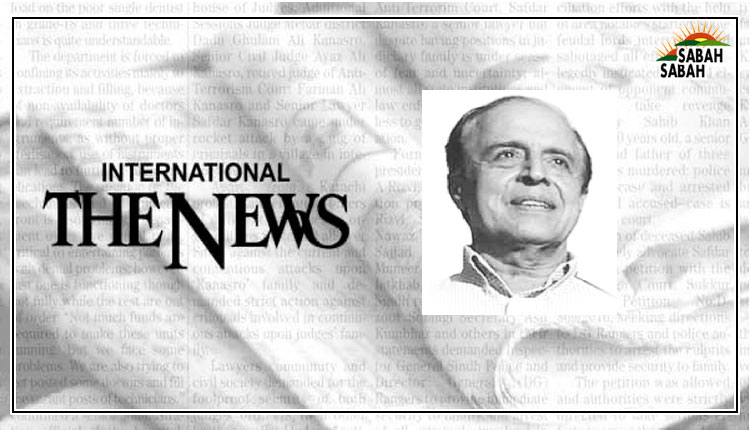Resizing the bureaucracy…Iftekhar A Khan
The Ministry of Health faces abolition since the Cabinet Committee on Rightsizing recently recommended it. It all started with the abolition of Pak-PWD some weeks ago when a federal cabinet meeting presided over by Prime Minister Shehbaz Sharif decided to abolish it for being inefficient and riddled with corruption.
A few weeks later, the cabinet body also considered reducing the number of ministries to trim down the size of the government. The country has a huge bureaucracy that needs a drastic reduction in its size given the struggling economy.
Curiously, when the prime minister ordered the abolishment of the Pak-PWD, he also approved the creation of the Pakistan Infrastructure Development Company to supervise the federal development projects. And all the provincial development projects under the supervision of the federal government will be handed over to the relevant provincial institutions. It raises some confusion. Why disband one department and create another to replace it? Wont salaries and other benefits be extended to the newly created department?
Most of the government departments in the country are bulging by overstaffing. The beneficiaries surely consider it a blessing but not the taxpayers who disapprove of government officials living a luxurious lifestyle and zooming by in luxury vehicles. Employing more officials and workforce than needed to perform certain duties amounts to being unfair to the taxpayers. Its a no-win situation between the taxpayers and the government. The government blames taxpayers for not paying taxes while taxpayers contend that their hard-earned money is flaunted to maintain the opulent style of the bureaucrats. A leading industrialist of the country once said that two-thirds of the bureaucracy had no work to do.
Allow me to quote a paragraph from one of my previous articles on the same subject. It has much to prove: Restructuring and reducing the bureaucracys size is always part of the manifesto of political parties before coming into power. Once in power, all such reforms are put on the backburner. For instance, in March (2020) the prime minister (Imran Khan) presided over a high-level meeting attended by ministers and advisers Asad Umar, Muhammad Mian Soomro, Dr Abdul Hafeez Shaikh and Abdul Razak Dawood. The prime minister instructed them to privatize loss-making state-owned entities within the year 2020.
Not a single department was privatized on Imrans orders four years later. Now Prime Minister Shehbaz Sharif recently wrote on his timeline, I am fully committed to building a more honest, dedicated and efficient bureaucracy that will deliver high-quality public service and raise standards of governance. About his decision to abolish Pak-PWD, he said his decision was a step towards removing the rot that was eating the system like cancer from within. May I suggest to the prime minister that Pak-PWD was not the only department inflicted with the cancer of inefficiency and corruption; there are other more deserving candidates in the government suffering from the same maladies.
The cabinet set up a committee to decide to close down five ministries and many SOEs to rightsize the federal government. Its a noble intention indeed if the purpose is achieved as planned. However, some huge loss-making organizations such as PIA and the Pakistan Steel Mills have successfully evaded privatization so far despite much work done on paper only. The PSM closed down in 2015 but its employees have been getting their salaries regularly. Reportedly, cumulative losses of eight state-owned organizations, PIA, PSM and Railways leading, ran into a staggering Rs2,201 billion in 2023.
Bureaucrats, government officials retired from high positions, and vested interests use their influence not to allow the privatization of SOEs. In principle, it is not for the government to establish and run big businesses and industries as state ventures. Setting up and running industries is a function that primarily belongs to the private sector. Theres healthy competition between industries in the private domain but never in the public sector.
Nevertheless, why do senior officers, judges of the superior courts, and ambassadors aspire for either extension in service or seek equally rewarding appointments in other departments instead of retiring honourably and going home? It is morally improper to get an extension in service when junior officers are sweating for promotion. All junior officers are anxious for promotions and it is unfair to deny them their rightful opportunities.
The writer is a freelance columnist based in Lahore. He can be reached at: pinecity@gmail.com
Courtesy The News












